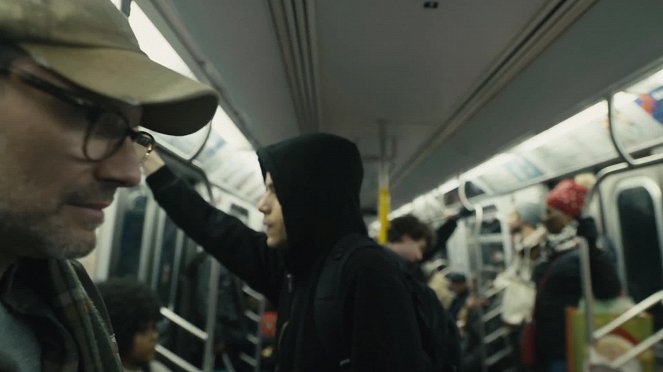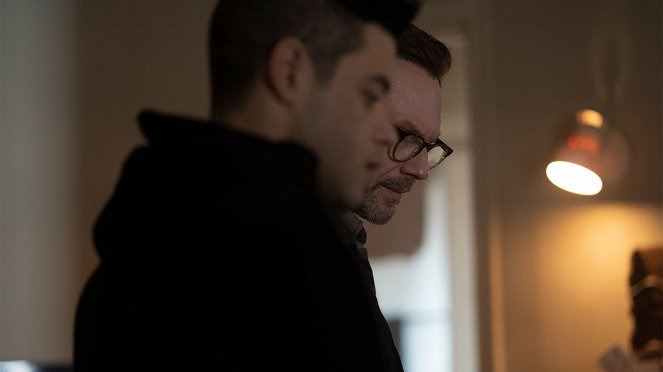TV-sarjan luojat:
Sam EsmailSävellys:
Mac QuayleNäyttelijät:
Rami Malek, Carly Chaikin, Christian Slater, Portia Doubleday, Martin Wallström, Michael Cristofer, Stephanie Corneliussen, Michel Gill (lisää)Suoratoistopalvelut (4)
Kaudet(4) / Jaksot(45)
Juonikuvaukset(1)
Mr. Robot kuvaa dystopiaa, jossa huippuälystä ja teknologiasta on tullut ihmiskunnan ylin ystävä ja samalla vaarallisin vihollinen. Ne jotka hallitsevat virtuaalimaailman, hallitsevat myös reaalimaailmaa. Missä kulkee oikean ja väärän raja, jos sinulla on äkkiä rajattomat vaikutusmahdollisuudet mutta myös vastuu tekemistäsi valinnoista? (Universal Sony Pictures HE Fin.)
(lisää)Videot (9)
Arvostelut (4)
When you see a good move, look for a better one. Undoubtedly, there is a lot that might be written about Mr. Robot. For example, about a refined formal aspect that many articles will certainly analyze (the introductory headlines, the framing of the characters in the lower third/corners of the screen, etc.). Whether it's imaginative work with an unreliable narrator, breaking through the fourth wall, as well as analyzing the details of a well-thought-out cold and refined Fincher - De Palma style of (audio) visuals and their role (especially from the second series, when Esmail directs everything himself) or how it plundered the German movie Who Am I. About how, thanks to the smart structure, it doesn't matter if you see through the twists and turns during the opening scenes or later when the creators reveal, because in both cases it works because a conscious game is played with the viewer in a way that "you think you know and we know very well that you think you know"" during all season. However, it is not based on the point anyway. The Malek's and Wallström's performances (not only) will be highly praised, as well as countless articles about how there is finally a show that does not mess with Linux-lovers community of the world of hackers, blackhats and the like. Forums will be packed witch comments addressing the meaning of each sentence, allusion or reference. But what is left for the "ordinary" viewer, who does not care about the above-mentioned and just wants to watch a good TV series? So such a viewer is by far the best, because Mr. Robot in a nutshell offers damn successful Palahniuk-like anarchist hacker Fight Club that combines corporate line of Underwoods by uncompromising pragmatism. Which could be enough for a viewer whose perception of the community from the dark side of modern technology is only based on novels with Lisbeth Salander to give a pilot episode a chance. Whether he will like it or not, is a completely different question, but Mr. Robot, even considering a bunch of great series of unprecedented quality of recent years, is so unique and courageous that it offers many reasons to give it a chance, despite its occasional problems with the pace of storytelling. And who knows, maybe the creators will hack you and you will fall for it. | S1: 5/5 | S2: 4/5 | S3: 5/5 | S4: 5/5 |
()
Mr. Robot stirred up the waters of TV production and became a term or even a revelation for many. It's no wonder - the production team knew the potential of the project and who its target audience was. The game the creators played had its inspiration in Palahniuk's cult classic "Fight Club." Those viewers who watched the German movie Who Am I at the time will find that Mr. Robot feels like its extended version. Fight Club worked great in a small space, but Mr. Robot, expanded into several TV series, can't avoid occasional stumbling and by extending some of the motifs, it reveals their fragility and overall artificiality. The effort to be fresh and cool under all circumstances and repeatedly play on the audience's gratitude effect sometimes disturbs me. After all, the creators obviously aimed at a younger audience; I'm simply not the target. The series presents itself as an anti-system piece with a socio-critical shade, but its cyber-anarchistic premises are shallow and obscure the fact that a similar kind of revolt would have devastating effects on ordinary people and certainly wouldn't lead to any "liberation." Corporations would withstand such an attack in a much better condition. Malek is the ideal choice for the lead role; I had no problem with him at all, and his presence ultimately determined my rating of 4 stars and an overall impression of 70%.
()
Elation. For the time being. Paranoia. Antisocial parallels with Dexter in the becoming environment of the web. Great acting, at last Rami Malek got the leading role and handles it with ease. Slater is fine too. Hope it maintains the quality... The unreliable narrator is back and, to make it worse, in an incredibly rotten and diverse world full of unstable people and fraudsters with power - or so it seems... maybe, probably. Often found it hard to keep up (putting on Mr. Robot at bedtime is a very bad idea) - there’s a whole bunch of twists.
()
Season 1 – 65% – There was so much potential, it was inevitable to be disappointed. The focused Rami Malek, the specific environment of the opaque hacking theme, the attractive neighbor, the unpredictable current state of the main character. This loaded pilot simply didn't last long, but it soon became clear how much more suitable a standalone miniseries would be. In ten episodes, all the tension gradually dissipates, some characters almost lose their justification with their unnecessary lines (Wellick went from unreadable to fatally incomprehensible), and when it comes to great revolutionary actions, paradoxically, the plot loses the most juice. In the second half of the season, I even lose interest in all the storylines where Elliot himself doesn't appear, and although the creators ascribed him an unbelievably combination of psychiatric diagnoses (not to mention that with the help of morphine, he would probably be incapable of thinking in no time), Malek plays everything so perfectly that I even swallow the last nervous glance into the viewers' eyes. The second season is a huge risk that can only succeed in attempting to reverse the premise into completely new levels. Plot jumps using shocking twists have exhausted themselves. Season 2 – 70% – The attempt at another significant twist this time rings somewhat hollow, but the second season holds surprisingly better together. This is facilitated by the even more brilliant Rami Malek and the fact that the disappeared Tyrell can't bother anyone. However, I have one fundamental problem with Mr. Robot that ruins the whole series for me. Although I understand its popularity and the viewer's desire to dissect every shot, I can't get rid of the feeling that Sam Esmail is mainly trying to prove to me how perfectly cool his series is. I feel this obvious effort in every shot, and even though many scenes are really formally perfect, the impressions quickly fade away during self-absorbed, unbearably slow dialogues and unfortunately also during unnecessary side storylines. It particularly saddens me with the divine presence of Grace Gummer, but I still can't go beyond three stars. Season 3 – 70% – Confusing manipulation of characters (unfortunately too little Dom, fortunately too little almost redeemed Tyrell), disproportionately dragged-out plot of all possible stages, but nevertheless, with a squint, a satisfying outcome with a specific and thankfully sufficiently paranoid and suspenseful atmosphere. I'm still most sad about my own contemplation of how perfect a miniseries Mr. Robot could have been, when instead it's just a slightly above-average technofairy tale. It remains questionable whether the increasingly polished and refined visual side will compensate for the fact that I stopped being interested in Darlene or Angela a long time ago. Season 4 – 85% – "Am I his monster?" I won't lie, with my conflicting relationship with the series itself and considering the hiatus between seasons, which lasted almost two years, I didn't have any desire for further hacking. In previous years, despite its undeniable quality, the central plot was stretched out disproportionately long, and the only way up was to focus on the core of the story again. And it happened. Gone are the endless theories and phases, Esmail writes about the main characters, their uncertainties, and the goal towards which the story visibly aimed from the very beginning, with few exceptions. In suspenseful moments, it gets on my nerves unbearably, and in moments of relaxation, I understand the dynamics of the narrative much less, but within the whole, things fit together easily like never before. However, I can't resist commenting on the ecstatic praise for each episode. I don't question that genre-closed episodes take your breath away, but both the shocking long-term reveals and the short-term ones (mint tea) can be seen from afar, and therefore, no fascinated staring at the screen happens for me. For me, unlike the majority of viewers, these top moments are not related to the endlessly bleak mood and indulging in the diagnoses of the main characters, but to promises of hope (the airport) or disarming catharses (the whole carefully built finale).
()
(vähemmän)
(lisää)



Mainos